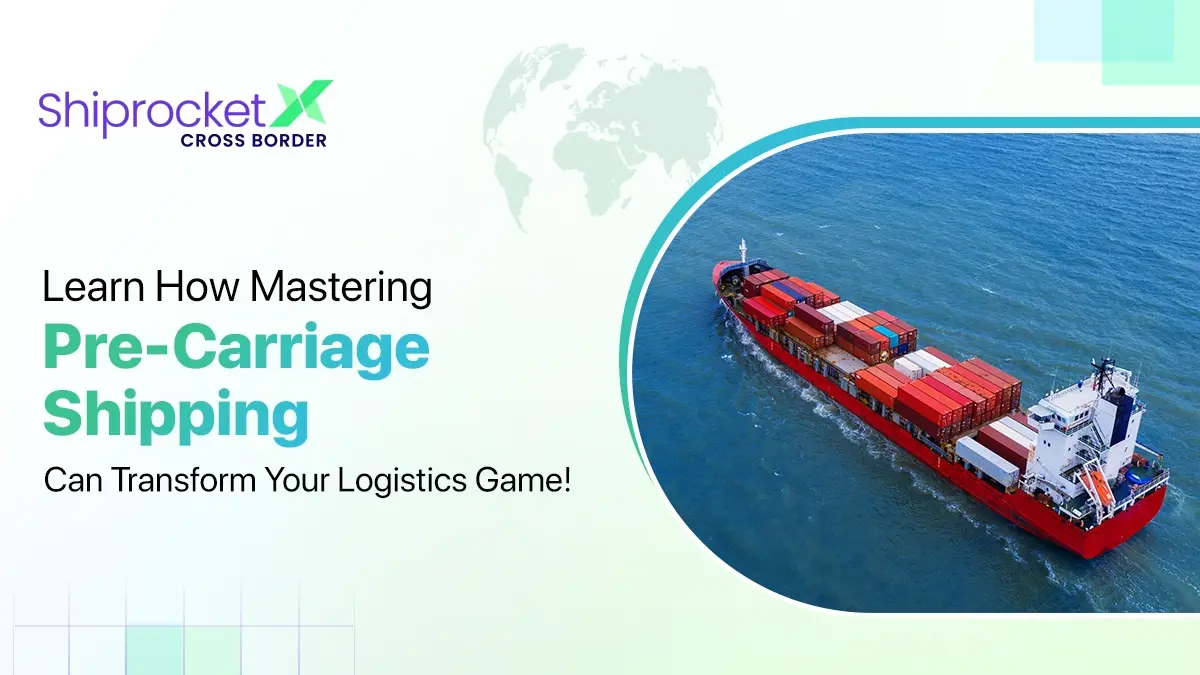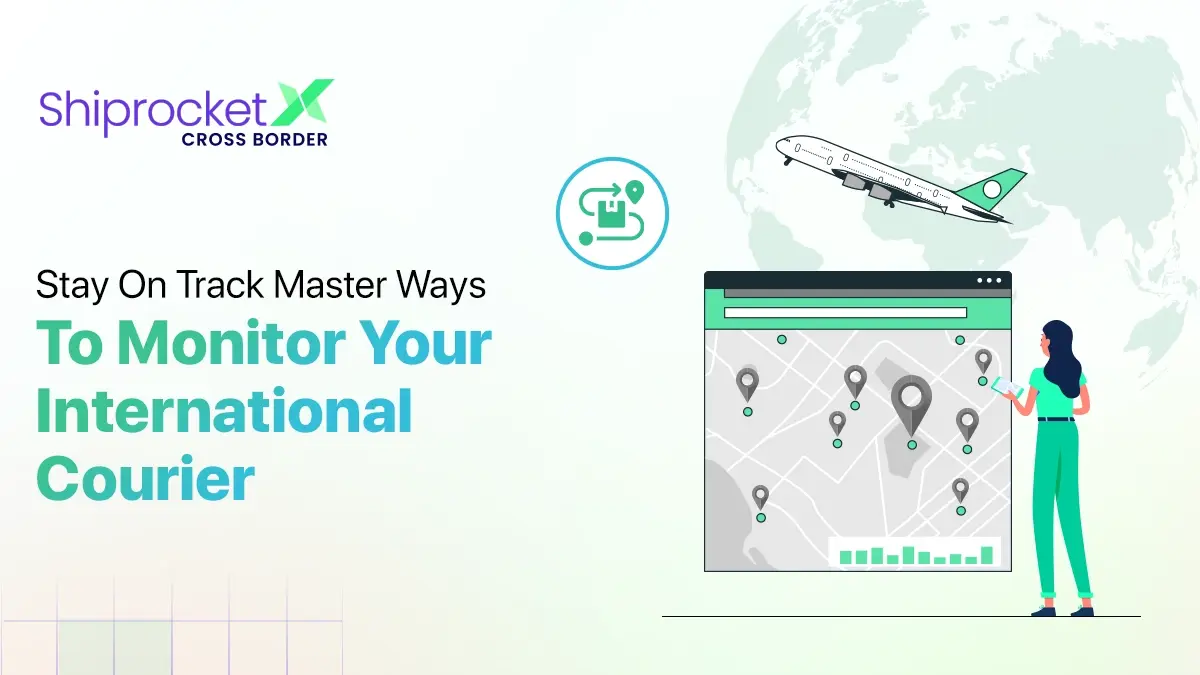What is Logistics: Definition, Importance and Types
Logistics involves the management of supply and timely transportation of products in good condition while keeping it cost-effective and efficient. It is a complex task as delivery time expectations are becoming shorter, and effective management of the entire supply chain is required to achieve them.
Any cargo movement from one point to another requires coordination and resources. Timely cargo deliveries to the end user require aspects like sourcing, warehousing, equipment management, and fleet management to ensure.
The global logistics market is estimated to reach $12,975.64 billion by 2027. The main factors contributing to this growth are the evolution of the eCommerce industry, new-age technologies, and improved logistics infrastructure.

What is Logistics?
Logistics is planning, storing, managing, and shipping goods from their point of origin to the end consumer (point of consumption).
Importance of Logistics
Effective logistics management leads to lower costs, increased efficiencies, proper inventory control, better production rates, optimal usage of warehouse space, and increased customer satisfaction. All these factors together contribute to the success of a business. Effective management of returns also helps generate revenues for the business.
Globalisation has created increasingly complex supply chains in the national and international markets. The movement of products, especially in the eCommerce sector, must be handled safely, timely, and cost-effectively. The boom in technology and the complexity of logistics processes have led to the growth of specialised logistics-focused aggregators like Shiprocket that help accelerate the movement of resources along the supply chain.
How Are Logistics Different From Supply Chain Management?
Logistics and supply chain management are often mixed up, but they aren’t the same thing. Logistics is all about the tasks within a single company, like buying materials, packing products, shipping orders, and getting them to customers.
Supply chain management is broader and involves multiple companies working together – from suppliers and shipping providers to call centers and distribution hubs – to get products to businesses and customers.
Types of Logistics

The different types of logistics services in the industry emphasise another aspect of the supply process. Various logistics services include inbound, outbound, reverse, green, third-party logistics (3PL), fourth-party logistics (4PL), fifth-party logistics (5PL), and digital logistics.
1. Inbound Logistics
Inbound logistics comprises the transportation, storage, and receiving of goods to a business. It is the movement of resources from suppliers to manufacturers. It is the first and most important step in the logistics value chain, as it can impact the remaining processes.
2. Outbound Logistics
Outbound logistics involves transporting semi-finished/finished products to customers from a warehouse or distribution center. It comprises various stages like warehousing, storage, distribution, transportation, and last-mile delivery. Outbound logistics’ primary objective is better customer satisfaction.
3. Reverse Logistics
Reverse logistics is transporting products from the end-users back to the warehouse or distribution center. It is associated with returns and recalls but is also used for recycling programs, asset recovery, and disposal. Reverse logistics aims to recover the product’s value, ensure customer satisfaction through a satisfactory returns experience, and reduce waste.
4. Green Logistics
Green logistics describes measuring and minimising the environmental impact of supply chain activities on the planet. It needs to be implemented without compromising on the quality of services and customer satisfaction.
5. Third-party
Third-party logistics, or 3PL, is where a business outsources the management of one or more components of procurement and fulfillment operations. The 3PL companies provide transportation, warehousing, inventory management, terminal operations, customs, freight forwarding, and reverse logistics. Most 3PL service providers partner with eCommerce merchants for fulfillment services.
6. Fourth-party
Fourth-party logistics, or 4PL, is where a business outsources its entire supply chain management and logistics to one external service provider. They are often called Lead Logistics providers and act as consulting companies for many supply chains.
7. Fifth-party
5PL logistics, also known as a logistics aggregator, focuses on an individual and broader supply chains. It combines the needs of the 3PL and others into a single bulk volume for getting better rates with different types of airlines and shipping companies.
8. Digital Logistics
Traditional methods of gathering data are manual and prone to human error. With the help of technology, the logistics processes can be digitised, improving and speeding up the overall supply chain processes. It comprises web-based enterprise logistics applications that allow the integration of various systems to provide a central logistics information backbone that provides visibility across the supply chain.
Functions of Logistics
Logistics entails various tasks that keep a business running smoothly:
- Inventory Management
Inventory management involves keeping tabs on what you’ve got in your warehouse or store, ensuring you have enough stock to meet customer demand. For larger retailers, it’s a never-ending task that needs constant attention. Good inventory management ensures staff can easily find and pack items for orders and helps determine stock levels and issues.
- Warehousing
Warehousing involves storing goods safely in an organised manner. Even small businesses, whether operating from a garage or a spare room, need a system to keep track of their stock. As businesses grow, more formal warehouse management systems are needed to keep things running efficiently, especially as space, stock, and staff numbers increase. Some warehouses double as distribution centres, handling storage and order fulfilment. For example, IKEA’s unique layout lets customers pick and carry their items, saving on staff and storage needs.
- Transportation Management
Transportation management focuses on planning and organising the movement of goods. It’s generally split into two parts: inbound and outbound. Inbound transportation involves bringing in raw materials or goods from suppliers or manufacturers—like a car mechanic arranging for parts to be delivered to their garage. Outbound transportation involves getting finished products from factories or warehouses to deliver them to retailers or customers.
- Demand Planning
Demand planning focuses on predicting what your customers will need so you can have appropriate and adequate stock available when demand spikes. This usually relies on past sales data, like seasonal trends; it also considers factors like new marketing campaigns, product launches, and social media trends.
These logistics functions are key to ensuring businesses get products to customers efficiently, keeping everything on track from the warehouse to the customer’s door.
- Order Fulfilment
Order fulfilment covers everything from picking and packing to shipping orders. It involves creating invoices, printing shipping labels, coordinating with carriers, and managing returns (or reverse logistics). Reverse logistics involves handling returns for repairs, replacements, refunds, or disposal. Many companies have processes to check if returned items can be resold and issue refunds. For online businesses, having a clear and easy returns policy can build customer trust, especially since buyers can’t see or try products in person.
Tips for Optimising Logistics Operations
1. Get Better Shipping Rates
Shipping can get expensive, claiming around 9% of a business’s annual expenses, according to Shopify. Many new business owners are caught off guard by how pricey it can be. If you’re shipping a low volume of orders, those shipping labels can add up. Carriers often give better rates to businesses that ship frequently. You can also outsource the process to a third-party logistics provider (3PL), who provide discounted rates.
2. Make the Most of Your Warehouse Space
Storage costs are gradually increasing; prices for storage containers increased by about 20% last year alone. Instead of spending more on a bigger warehouse, it’s worth maximising the space you already have with some clever design tweaks. Use tall or stackable shelving to use vertical space, set up designated areas for picking and packing, group similar items together, and clearly label everything, including shelves and bins. Keeping your bestselling items close to packing stations can even save time by reducing the distance that your team has to travel when picking orders.
3. Optimise Delivery Routes
Route optimisation is a smart way to find the best and cheapest delivery routes. For example, if you have warehouses in Delhi, Mumbai, and Chennai, shipping from the closest location makes sense to cut costs and delivery times. It is more eco-friendly as it reduces fuel usage and carbon emissions. Route optimisation can also help your deliveries avoid traffic, bad weather, or other delays, making it easier to meet two-day or next-day delivery promises.
4. Automate Your Supply Chain
Logistics is just one piece of the supply chain puzzle; automation can make a big difference. Investing in automation tools that work with your logistics and warehouse management systems can save time on repetitive tasks like picking orders or printing shipping labels. This speeds up order processing and reduces human errors. Automation also helps you manage inventory.
Conclusion
Evolving logistics technology and the need to implement sustainable logistics require investment in digital technology to build a long-term advantage for a business. Logistics in the supply chain improve the quality of processes and ensure quick adaptability to changing market demands.
FAQs(Frequently Asked Questions)
The Chartered Institute of Logistics & Transport, UK (2019) defines them as getting the Right product, in the Right quantity, in the Right condition, at the Right place, at the Right time, to the Right customer, and at the Right Price.
The elements of logistics are material sourcing, transportation, order fulfilment, warehousing, demand forecasting, inventory management, and supply chain management.
By utilizing technology, streamlining processes, optimizing inventory, working with reliable partners, and monitoring performance, businesses can effectively manage their logistics operations and stay competitive in today’s market.






